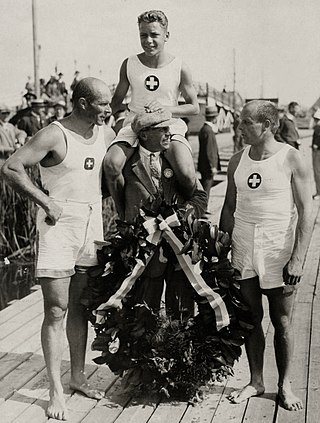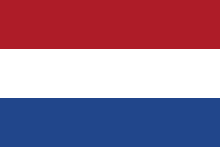
At the 1900 Summer Olympics in Paris, four events in rowing were contested, marking the introduction of the sport to the Olympic program. At the inaugural 1896 Games, the rowing competition was cancelled due to strong winds. The 1900 regatta was held on the Seine between the Courbevoie Bridge and the Asnières Bridge on 25 and 26 August. The length of the regatta course was 1,750 metres. Two finals were held in the coxed four competition, with both finals being considered Olympic championships. Thus, there were a total of five rowing championships awarded.

France was the host of the 1900 Summer Olympics in Paris. France was one of many nations that had competed in the 1896 Summer Olympics in Greece and had returned to compete at the 1900 Games.

Belgium competed at the 1900 Summer Olympics in Paris, France. It was the first appearance of the European nation. Belgium was represented in France by 78 athletes, all of them male, who competed in 11 disciplines. They comprised 95 entries in 28 events.

Germany competed at the 1900 Summer Olympics in Paris, France.

The men's coxed pair was one of the competitions in the Rowing at the 1900 Summer Olympics events in Paris. It was held on 25 August and 26 August 1900. 7 boats, involving 22 rowers from 3 nations, competed. The event was won by a mixed team; Minerva Amsterdam's Dutch crew replaced its coxswain with a local French boy for the final. François Brandt and Roelof Klein were the rowers, with Hermanus Brockmann the cox in the semifinals; the French cox is unknown. Second and third places both went to French boats; Société nautique de la Marne took silver while Rowing Club Castillon earned bronze.

The men's coxed four was one of the competitions in the Rowing at the 1900 Summer Olympics events in Paris. The competition was plagued by controversy involving which boats should advance to the final. In one of the most unusual decisions in Olympic history, two separate finals were held for the event, each of which is still considered an Olympic championship by the International Olympic Committee. The crews of all six boats to compete in the two finals are Olympic medallists.

The men's coxed pair event was a rowing event conducted as part of the 1964 Summer Olympics programme. It was held from 11 to 15 October. There were 16 boats from 16 nations, with each nation limited to a single boat in the event. The event was won by American crew Edward Ferry, Conn Findlay, and coxswain Kent Mitchell. Findlay had been on the United States gold medal crew in 1956 and bronze medal crew in 1960; he was the first man to earn two gold medals in the event, as well as the first man to win three medals of any color in the event. Mitchell had also been on the 1960 crew, and was the seventh man to earn multiple medals in the coxed pair. Jacques Morel, Georges Morel, and cox Jean-Claude Darouy took silver to earn France's first medal in the event since 1952. Herman Rouwé, Erik Hartsuiker, Jan Just Bos earned what was formally the Netherlands' first medal in the event; a pair of Dutch rowers had won the first edition in 1900, but had jettisoned their cox in favor of a local French boy between rounds and thus that medal was a "mixed team" medal.

The men's coxed four event was a rowing event conducted as part of the Rowing at the 1964 Summer Olympics programme. It was held from 11 to 15 October. There were 16 boats from 16 nations, with each nation limited to a single boat in the event. The event was won by the United Team of Germany, the nation's second consecutive victory in the men's coxed four. The two medals placed the United Team of Germany in a tie for second-most all-time with Switzerland and Italy; Germany had the most with four. Italy earned its third straight medal in the event, all of different colours, with a silver in Tokyo. The bronze medal went to the Netherlands, the nation's first medal in the event since 1900.

The Sur la Perche à la Herse event was part of the archery programme at the 1900 Summer Olympics. Only the names of the three top placers are known.

The Sur la Perche à la Pyramide event was part of the archery programme at the 1900 Summer Olympics. Only the names of the three top placers are known.
Hermanus Gerardus "Herman" Brockmann was a Dutch coxswain who competed in the 1900 Summer Olympics.

The Netherlands first sent athletes to the Olympic Games in 1900, and has participated in almost all Games since then with the exception of 1904 Summer Olympics in St. Louis. The Netherlands boycotted the 1956 Summer Olympics in Melbourne as a protest against the Soviet invasion in Hungary just a few weeks before the beginning of the Games.

The men's eight competition at the 1996 Summer Olympics in Atlanta, Georgia took place at Lake Lanier. It was held from 21 to 27 July. There were 10 boats from 10 nations, with each nation limited to a single boat in the event. The event was won by the Netherlands, the nation's first victory in the men's eight and first medal of any color in the event since 1900. Germany took silver; it was the 9th time in the past 10 Games that a German team was on the podium, with the only exception being 1984 when no German boats competed. Russia earned bronze in its independent debut.

The men's coxed pair event was part of the rowing programme at the 1920 Summer Olympics. The competition was held on 28 and 29 August 1920. It was the second appearance of the event, which had previously been held only at the inaugural rowing competitions in 1900. Four boats, each from a different nation, competed. The event was won by the Italian boat in that nation's debut in the event, with Ercole Olgeni and Giovanni Scatturin the rowers and Guido De Felip the coxswain. France's crew took silver, the second consecutive silver for France. Switzerland earned bronze.

The men's coxed four event was part of the rowing programme at the 1920 Summer Olympics. The competition was held on 28 and 29 August 1920. It was the third appearance of the event, which had previously been held inaugural rowing competitions in 1900 as well as in 1912. Eight boats, each from a different nation, competed. The medals all went to nations that had not won a medal in the men's coxed four previously: Switzerland and the United States took gold and silver, respectively, in their debuts in the event; Norway took bronze.

The men's eight event was part of the rowing programme at the 1920 Summer Olympics. The competition was held on 28 and 29 August 1920. It was the fifth appearance of the event. Eight boats, each from a different nation, competed. It was the first time that nations were limited to a single boat. The event was won by the United States in a final against Great Britain; the two nations had taken all four previous gold medals. Bronze went to Norway, the nation's first medal in the men's eight. In addition to gold medals, the winners received a challenge prize that had been donated by Eugenio Brunetta d'Usseaux before his death in 1919.

The men's coxed four event was part of the rowing programme at the 1924 Summer Olympics. The competition, the fourth appearance of the event, was held from 13 to 17 July 1924 on the river Seine. There were 10 boats from 10 nations, with each nation limited to a single boat in the event. The event was won by Switzerland, the nation's second consecutive victory in the event; the two Swiss victories matched Germany for most among nations to that point. France earned its first medal in the event since 1900 with silver. The United States reached the podium for the second straight Games with a bronze medal. Hans Walter, a member of the Swiss crew in 1920 as well as this year, was the first man to win two medals in the event, and the only one to win two golds.

The men's coxed pair event was part of the rowing programme at the 1928 Summer Olympics. It was one of seven rowing events for men and was the fourth appearance of the event. It was held from 3 to 10 August near Sloten, Amsterdam. There were 6 boats from 6 nations, with each nation limited to one boat in the event. The event was won by the Swiss team, the nation's second consecutive victory in the event. Brothers Hans Schöchlin and Karl Schöchlin rowed, with Hans Bourquin the coxswain. Another pair of brothers took silver: France's Armand Marcelle and Édouard Marcelle. The Belgian bronze medal team consisted of Léon Flament, François de Coninck, and Georges Anthony; it was the nation's first medal in the event.

The men's coxed pair competition at the 1952 Summer Olympics took place at Meilahti, Finland. It was held from 20 to 23 July. There were 15 boats from 15 nations, with each nation limited to a single boat in the event. The event was won by French team Raymond Salles, Gaston Mercier, and coxswain Bernard Malivoire; it was the nation's first victory in the event. Germany, which had won the event in 1936 but had been excluded from the 1948 Games after World War II, took silver. Sweden, the defending champions, had an all-new crew of Svend Ove Pedersen, Poul Svendsen, and cox Jørgen Frantzen; they took bronze.

The men's coxed pair competition at the 1968 Summer Olympics took place at Virgilio Uribe Rowing and Canoeing Course, in the Xochimilco borough of Mexico City. It was held from 13 to 19 October. There were 18 boats from 18 nations, with each nation limited to a single boat in the event. The event was won by the Italian crew, rowers Primo Baran and Renzo Sambo and coxswain Bruno Cipolla; it was Italy's first victory in the event since 1920 and second overall. The Netherlands made the podium for the second consecutive Games, though with an all-new team: Herman Suselbeek, Hadriaan van Nes, and cox Roderick Rijnders took silver. A Danish boat medaled in the event for the first time since 1952, with Jørn Krab, Harry Jørgensen, and Preben Krab earning bronze. The American medal streak of three Games ended with the United States boat placing fifth.















